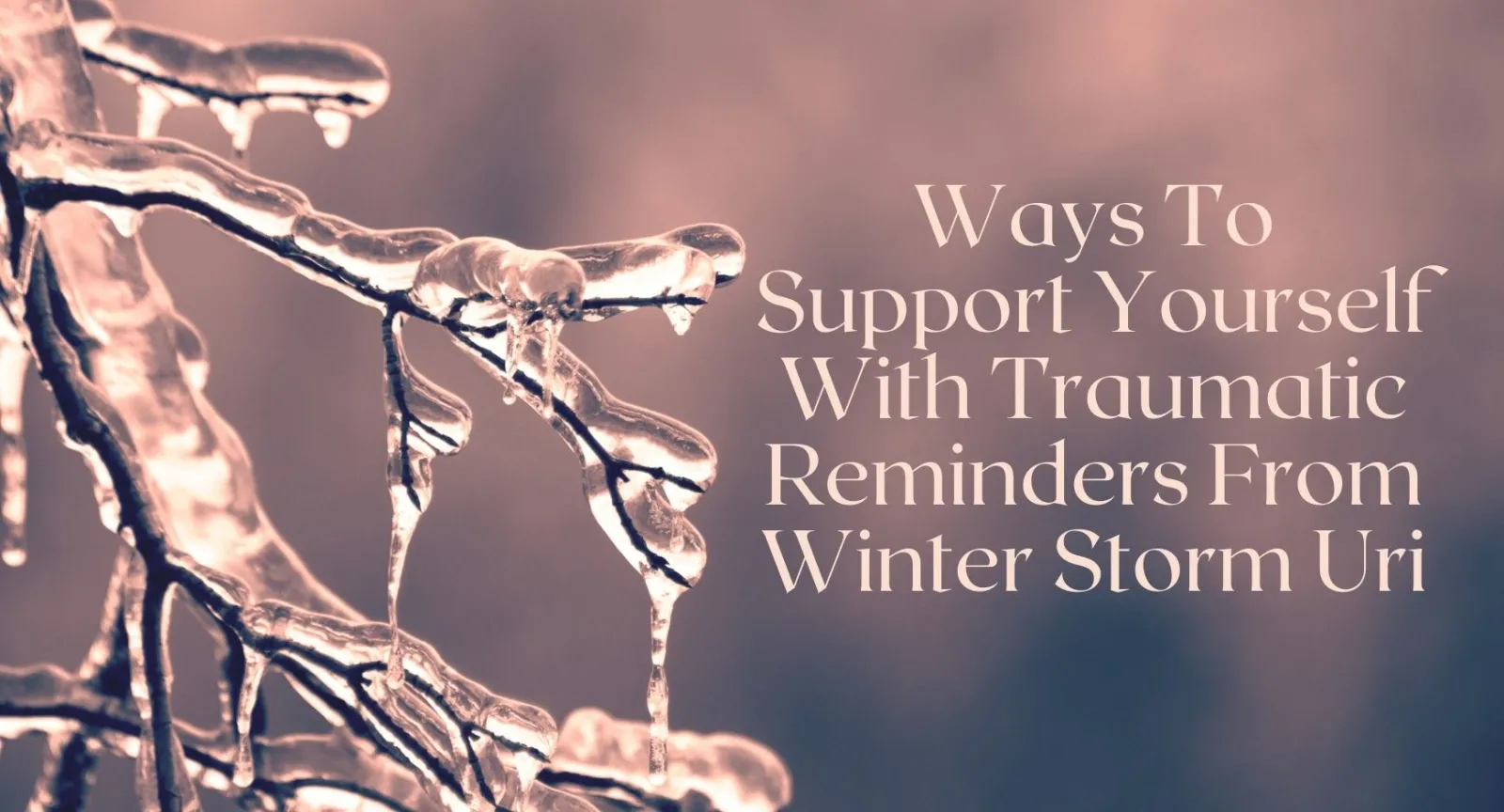
During winter storm Uri, many in the UT community found their basic survival needs threatened. Bursting pipes and lack of utilities led to dropping temperatures, unsafe living conditions, darkness, and no way to preserve or prepare food. As batteries died and candles burned out, there were long, dark nights. Phones batteries died, leaving people unsure how they could reach needed help or know if loved ones sheltering in other places were safe. Treacherous roads led to an inability to access food and water as supplies dwindled.
Having basic survival needs threatened in this way is traumatic to our nervous systems. Sensory cues that are similar to what people faced in the storm can trigger strong feelings and vivid memories of the traumatic experience. These cues may also trigger a low level of anxiety without any connection to memories of the storm. Examples of current sensory cues that could trigger reactions are:
- Feeling colder winter temperatures
- Experiencing more darkness with the shorter days of winter
- Seeing cold weather alerts or related news on the television or mobile devices
- Getting out winter clothes
- Having a low battery on devices or utilities not working
- Smells of not showering or bathing
- Seeing a limit of food options at stores
It is also normal to have emotional reactions after living through a trauma, even a year later. The strategies below can offer tips for caring for yourself emotionally if you are experiencing impacts from last year’s storm.
Acknowledge your feelings, including grief: In order to care for yourself and others, it is important to name, notice, and acknowledge the physical and emotional responses that occurred from Winter Storm Uri and that are coming up now. For example, you might notice lower energy with the shorter and colder days and feel sadness. You can acknowledge that you (and many other people) might feel sadness at the reminder of the colder temperatures from last year. You can give yourself permission to feel that feeling and know that this is a way that the body is trying to keep itself safe by reminding you of the danger and loss that you went through last year.
Manage feelings: Once you have named and acknowledged your feelings, you can express them, connect with trusted people in your life about what you experience, and bolster routines that promote your health. It may be helpful to connect to people who went through the winter storm with you last year, such as neighbors or coworkers.
Develop trauma-informed coping statements and approaches: Trauma in the body impacts our thoughts and beliefs, emotions, sensations, and behaviors. We cannot simply talk ourselves out of having any traumatic symptoms because these symptoms are there to try to alert us to potential danger. We as humans can take a trauma-informed approach to coping, in some of the following ways:
- Ground the body through breathing practices, feeling feet on the floor and seat on a chair, doing one action at a time (such as coloring or brushing hair)
- Speak to yourself in a compassionate manner, like you would to a good friend
- Use coping statements that are truthful and reflect your next steps, such as, “This feels scary. Let’s take things one action at a time” or “You are taking steps to take care of yourself by keeping extra food, water, and batteries in your home. You are more prepared than you were last winter” or “I can problem solve and connect with others if things become unsafe again because of a winter storm.”
Take Effective Action: When we are triggered or overwhelmed, we may shut down or work up our anxiety by trying to plan for every possible scenario. Effective action is a more balanced approach in that we can take some steps to prepare by addressing the problems that we can impact. For example, someone could make an emergency kit and talk to two friends or neighbors about how they would communicate and support each other if there was another winter storm or natural disaster (including sheltering together and sharing resources). After doing these actions, this person can feel some sense of being prepared for their basic needs, should a storm arise.
Find breaks from triggers: Know when to take breaks from reading the news or listening to stories with reminders of the winter storm. As humans, we are not meant to experience danger in our bodies all of the time, particularly when the danger is not currently happening. You can tell yourself that you need a break and that you can come back to important information when you need to.
In a following article, there will be tips for winter preparedness, as having practical preparedness to care for yourself and others should another winter emergency occur can balance the shock and fearfulness from last year’s storm.
If you would like additional support around traumatic events from natural disasters like Winter Storm Uri, please contact our counselors at the Employee Assistance Program (EAP) of UT Austin at (512) 471-3366 or eap@austin.utexas.edu.
